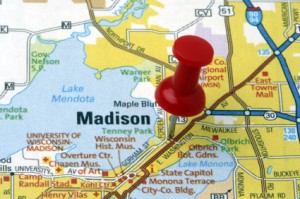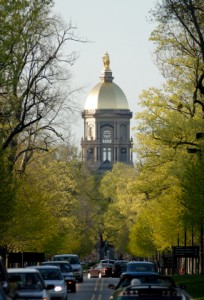6 reasons why you should care about the teachers’ union protests in Wisconsin
 Unless you’ve been living under a rock, you’ve probably heard about the union protests that are spreading throughout the country like wildfire.
Unless you’ve been living under a rock, you’ve probably heard about the union protests that are spreading throughout the country like wildfire.
Approximately 70,000 people flooded to Wisconsin’s capital city of Madison this past Saturday to protest a proposed bill introduced by Wisconsin’s Republican Gov. Scott Walker. As part of a budget repair bill, which was introduced on February 11th, Walker’s proposed changes would restrict a worker’s right to negotiate better pensions, salaries, and health benefits.
President Barack Obama has publicly stated that taking away a union’s bargaining rights was like “an assault on unions.” Even Tom Morello of Rage Against the Machine/the Nightwatchman has spoken out to support the protesters, claiming that “Madison is the next Cairo,” and Walker is the “Mubarak of the Midwest.” (Morello has been a long-time supporter of unions because his mother used to work as a teacher in Illinois).
You as an intelligent American citizen should be
Whether you are a high school graduate or a college freshman, as an intelligent American citizen you should be concerned about what is going on in Wisconsin, and here’s why:
1. It affects freedom of thought and expression in classrooms
Because good teacher contracts essentially “protect academic freedom,” this new proposed bill could limit what is discussed in classrooms, what textbooks are used in schools, and whether evolution should be taught to students.
Not only that, the proposed bill will also impact class sizes, teacher workloads, curriculum planning, and so much more.
2. It could affect your future career
Even if you don’t plan on becoming a teacher, the proposed bill will affect all sorts of union workers, such as policemen, postal workers, pilots, administrators, nurses, firefighters, state troopers, etc.
Because collective bargaining helps unions determine various conditions of employment and pay rates, this could have a negative impact on decisions regarding sick leave, promotion, retirement, grievance procedures, and work rules.
Union officials have also stated that collective bargaining helps protect workers against racial or age discrimination. Or, for example, if you are a union worker and your employer doesn’t like you, your rights as a union member will protect you from being laid off from your job.
3. The domino effect
Ever since the news broke of the new proposed bill in mid-February, anger has trickled over state lines and has impacted much of the Midwest.
And to make matters worse, Republican lawmakers are already in the process of introducing anti-union and anti-worker legislations in states such as Idaho, Indiana and Ohio.
Also, in what is being called “A Rally to Save the American Dream,” MoveOn.org and 45 other groups known for supporting Democratic candidates, called for union supporters to protest in 50 different states on Saturday, February 26th. (Click here to see photos of the rallies).
4. It needlessly tests the beliefs and values of teachers 
Some union workers and Democrats believe that the proposed bill is “an attempt to cripple union support for Democrats.” The co-president of Madison’s Teaching Assistants’ Association, Alex Hanna, has spoken out against the bill stating that it is “undemocratic and obviously politically motivated.”
The proposed bill has rubbed teachers the wrong way, especially those who feel strongly about their personal values or beliefs when it comes to politics and religion. Instead of the sole issue being about worker’s rights, the issue has sparked a political debate and has forced a polarization between those with differing political opinions.
For example, some conservative-minded individuals believe that by giving teachers more freedom to choose what to teach in classroom, students could be used as pawns to support the goal of unions. Students may be taught to stand up for unions which could be seen as a subversive way to get around government actions through legalized curriculum.
5. The rich get richer and the middle-class get poorer
Union supporters also believe the proposed bill will have a devastating impact on the working and middle class. With Gov. Walker’s proposed bill, state employees will soon have to start making payments towards state pensions and health insurance, thus the wallets of the working class will be affected the most.
One major underlying issue that angers protesters is the fact that they are sick and tired of seeing big corporations take money away from the working class. By taking away a teacher’s rights to negotiate the terms of their employment, there will be less middle class values in the educational field.
6. The times are a-changing
Many believe that the protests in the Middle East have been a driving force for Americans to take to the streets and speak up for the rights of union workers.
In this current economic state, the last thing teachers want to hear is that they need to pay more money out of their pockets. Despite the fact that the rights of union workers has been an ongoing issue for years, the recession has forced the situation to a boiling point.
And to make matters worse, this new bill will be turning back the clock for many unions who have been working to provide “round-the-clock” emergency medical services coverage which took years to develop.
It’s time to move forward and demand change, not take a step backwards.
But let’s not forget that these protests aren’t just about teacher’s rights, it’s about putting the education of students first.


 While some economists believe the recession is over, this data reveals that the recession could well be a double-dipper, if not a stagnator. The high unemployment rates mean that a large segment of America still has little in the way of disposable income and will remain in such a plight for the near future.
While some economists believe the recession is over, this data reveals that the recession could well be a double-dipper, if not a stagnator. The high unemployment rates mean that a large segment of America still has little in the way of disposable income and will remain in such a plight for the near future. But that is precisely what Harvard Law professor Mary Ann Glendon has done. Citing the school’s invitation to Barack Obama to deliver the 2009 commencement address and plan to award the president an honorary degree, Glendon has politely said thanks, but no thanks to the university.
But that is precisely what Harvard Law professor Mary Ann Glendon has done. Citing the school’s invitation to Barack Obama to deliver the 2009 commencement address and plan to award the president an honorary degree, Glendon has politely said thanks, but no thanks to the university. Moreover, in her letter to Rev. John I. Jenkins, Notre Dame’s president, she noted that the university appeared to be seeking to use her to balance off the more recent, unpopular selection of Obama.
Moreover, in her letter to Rev. John I. Jenkins, Notre Dame’s president, she noted that the university appeared to be seeking to use her to balance off the more recent, unpopular selection of Obama. 